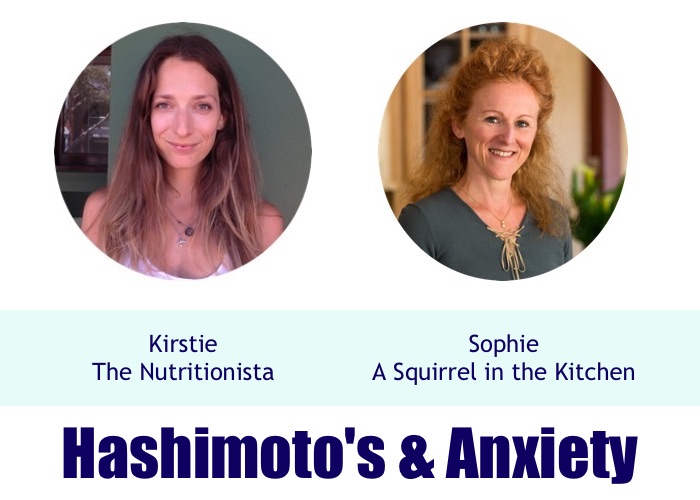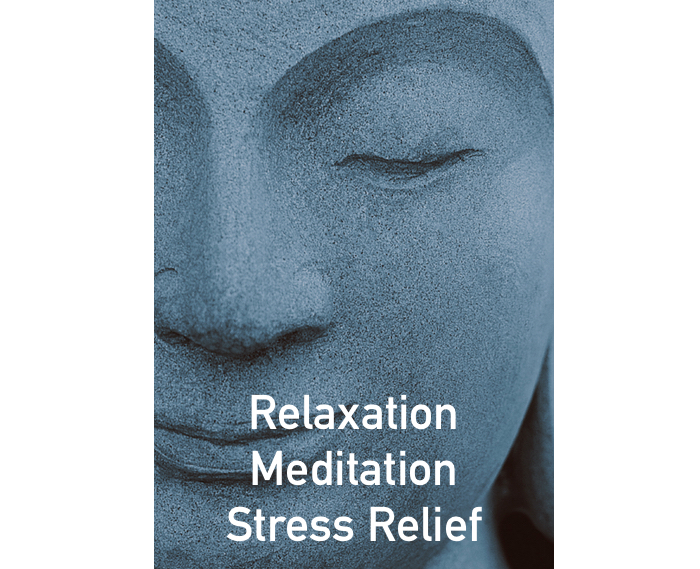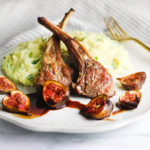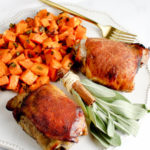
Kirstie and Sophie, two autoimmune warriors and AIP bloggers, talk about Hashimoto’s and anxiety. They are sharing their story of recovery so that hopefully you may find ways to relieve your stress, anxiety, and panic attacks.
To read the first part of this article, click here.
Sophie is an autoimmune warrior, foodie, and recipe developer. She blogs at A Squirrel in the Kitchen, where her mission is to demonstrate that you can eat gourmet meals on the autoimmune protocol (AIP)! Her French heritage shines through in her simple, yet creative cooking style and her recipes are doable even for beginning cooks. She lives in Colorado with her husband and their three teenage girls. Diagnosed with Hashimoto’s disease in 2009, she experienced severe anxiety, insomnia, and panic attacks. She is sharing today her story of recovery. You can find her on Facebook, Pinterest, and Instagram.
Kirstie is an AIP newbie, fashion industry survivor and nutritionist in training! Kirstie was diagnosed with Hashimoto’s in 2013 and after initially just taking her pills and still not feeling that great, she realized that there must be a reason why her body had started attacking itself. And so the journey began! Quitting sugar, cutting out gluten and a career change were the first steps for her journey back to good health. The siren call of the Autoimmune Protocol elimination diet soon beckoned, and her education in delicious and nutrient dense home cooking got started! Living in Sydney with Mr Nutritionista, Kirstie can usually be found at her local farmers market, on her bike or, of course, in the kitchen. Kirstie blogs at www.thenutritionista.com and can also be found on Facebook and Instagram (usually stalking other AIPers!).
5 – How do you manage your anxiety and panic attacks?
Sophie – I implemented multiples strategies to help manage my anxiety and panic attacks.
First, switching my diet to the autoimmune protocol has made a huge difference for me. As I removed all the inflammatory foods I was eating before, not only did I heal my gut, but I felt so much better in my head! Beware especially of sugary foods!
Second, I started taking natural supplements to help reduce the effects of stress and anxiety. All these supplements were prescribed to me by my functional medicine practitioner. Now this is not a quick fix! Natural remedies take time to get into your system and develop their full potential.
Third, I worked a lot with my therapist to develop a “tool box” I could use daily to reduce my anxiety. Such a tool box is a list of simple and effective techniques that will help you relax and slow down your thoughts. By practicing these techniques every day, you will slowly loosen the grip of anxiety and find peace and relief.
Here are some examples:
- journaling
- relaxation response
- meditation
- exercise
- taking a hot bath
- talking to someone
- breathing exercises
- massages
——————–
Kirstie – I cut out caffeine a little while after the first panic attack (I was drinking 2-3 cups per day) and that definitely helped reduce my anxiety symptoms, but it wasn’t a cure.
Over the years, the number of panic attacks decreased to a point where I’d only experience them rarely, and I don’t really know why this happened. Life in general did settle down after university, I was living back with Mr Nutritionista, I was eating better and my family situation was settling down somewhat. I do wonder if it could also have been to do with the progression of Hashimoto’s, perhaps as hypothyroidism took over from the hyper episodes? But as I hadn’t been diagnosed at that point I really don’t know.
Fast forward to today and although I do still feel anxiety on the very rare occasion (I nearly had a panic attack when recording our AIP Google Hangout on managing Hashimoto’s – true story!) I feel that it’s at a level where it’s manageable and there are a number of factors that have helped with that:
- Following AIP – which involves cutting out inflammatory foods from my diet, getting enough sleep, reducing stress and introducing balance into my life has helped hugely. Really, how could it not? I now meditate, say no if I want to and don’t feel bad about it, and I look after myself in a way that I never have before, which are all tenets of the AIP lifestyle.
- Regular acupuncture – I didn’t start this specifically to manage anxiety, but it definitely helps
- Having an incredibly supportive partner
- Attitude – I’m at a point in my life where I’m not as concerned about what others think, whereas my experience has shown that anxiety and panic thrive in an environment of fear. Sophie and I are recording another Autoimmune Connection soon – on anxiety – and if I feel myself having a panic attack again, or feelings of anxiety (how ironic would that be?!), then so be it. Let it happen!
6 – What will trigger your anxiety or panic attacks now?
Sophie – I don’t have anymore autoimmune flares causing anxiety or panic attacks. However, certain situations in my life have the potential to trigger my anxiety. For example talking in front of a lot of people, a root canal, or dealing with negative people in my life. When my anxiety levels go up, I immediately open my “tool box” and use my techniques to relax and bring the anxiety down. With practice, it becomes easier and the bouts of anxiety go away more rapidly.
——————–
Kirstie – Haha – Google Hangouts! I also definitely feel more susceptible to them when I haven’t been looking after myself, if I haven’t slept very well, or haven’t had enough down time and then find myself having to be in a new situation or meeting new people, things like that.
7 – Have you told family and friends that you experience anxiety and panic attacks?
Sophie – When you experience anxiety to the point of having panic attacks, there is no way you can hide this from the people you live with. And that is ok because you will need their help and support while you work your way out of your anxiety disorder.
I believe that the main reason I was able to get my anxiety under control is the time and commitment I dedicated to my healing. For several months, taking care of myself was my number one priority. During that time, my husband was the only one bringing an income at home. My children also had to pick up a lot more chores around the house and be more responsible for themselves.
Outside of my immediate family, I always tried to hide my troubles though, except for one very good friend. I felt like if I could put up a good front, things weren’t as bad as they really were. It is only recently that I opened up and started sharing my story, in the hopes that others may benefit from my experience.
——————–
Kirstie – I was living away from Mr N and my family when all this started, and I don’t remember telling them about it, or if I did not the full extent of what I was experiencing. I’m sure my new friends at university, my housemates and my work colleagues must have noticed something weird was going with me, or perhaps they just thought that’s that how I was, but I didn’t confide in any of them either. Similar to Sophie, I felt that telling people about it would somehow make it more real, and I was also worried about being judged, so I just tried to deal with it by myself.
Now, I do tell people about it. I hope that by sharing my experiences I can help others and I also feel it helps reduce my own anxiety.
8 – What advice would you give to someone else experiencing anxiety and panic attacks?
Sophie – Recovering from PTSD is the hardest thing I have ever done in my entire life. It does require total commitment and perseverance. You need to practice your relaxation techniques every single day, no matter which amount of work you have to do. You might even have to quit your job for a while until you get back on your feet.
I would strongly recommend that you find a good therapist to work with, familiar with anxiety and PTSD. I experienced such a relief and rapid improvements from being able to talk to someone about my problems. A good therapist will help you build your ‘tool box” and develop techniques to cope with your stress and anxiety.
You might experience set-backs. It is not uncommon that after feeling better for a while, the anxiety creeps up again on you. Just go back to what you know works best for you. Maybe you have been slacking on your meditation and need to practice more!
——————–
Kirstie – I totally agree with what Sophie has said – you need to work on it and not just ignore it and hope it goes away. Set yourself up with a “toolbox”, like Sophie’s, that will help you manage the situations as they arise.
9 – Will the anxiety and panic attacks go away?
Sophie – That was one of the first question I asked my therapist, and her answer was: “Probably not, but you will learn to live with it.” I remember feeling greatly disappointed with her answer. I just wanted the anxiety to go away!
It has been 6 years now and I understand her message. The anxiety is still present, but I have been able to lower it to a point where I can live with it. Anxiety becomes less intense, less painful, and it doesn’t prevent me from living normally and enjoying life. I have to be careful though and make sure that I practice my relaxation techniques every day.
——————–
Kirstie – It’s around 18 years on from my first panic attack and I sadly can’t say that they have totally gone away but they have greatly reduced to a point where I don’t feel that anxiety or panic attacks get in the way of my enjoyment of life. I wish I could have got to this point sooner, and I think, with help, I could have. I don’t regret the path I took, but I definitely wouldn’t recommend it to others!

Are you suffering from anxiety and panic attacks? Please share your story with us in the comments so that others may benefit from your past experience and find relief!
To read the first part of this article, click here.
This post contains affiliate links. Read here what it means.







[…] Don’t miss our post on Hashimoto’s and anxiety part 2! […]